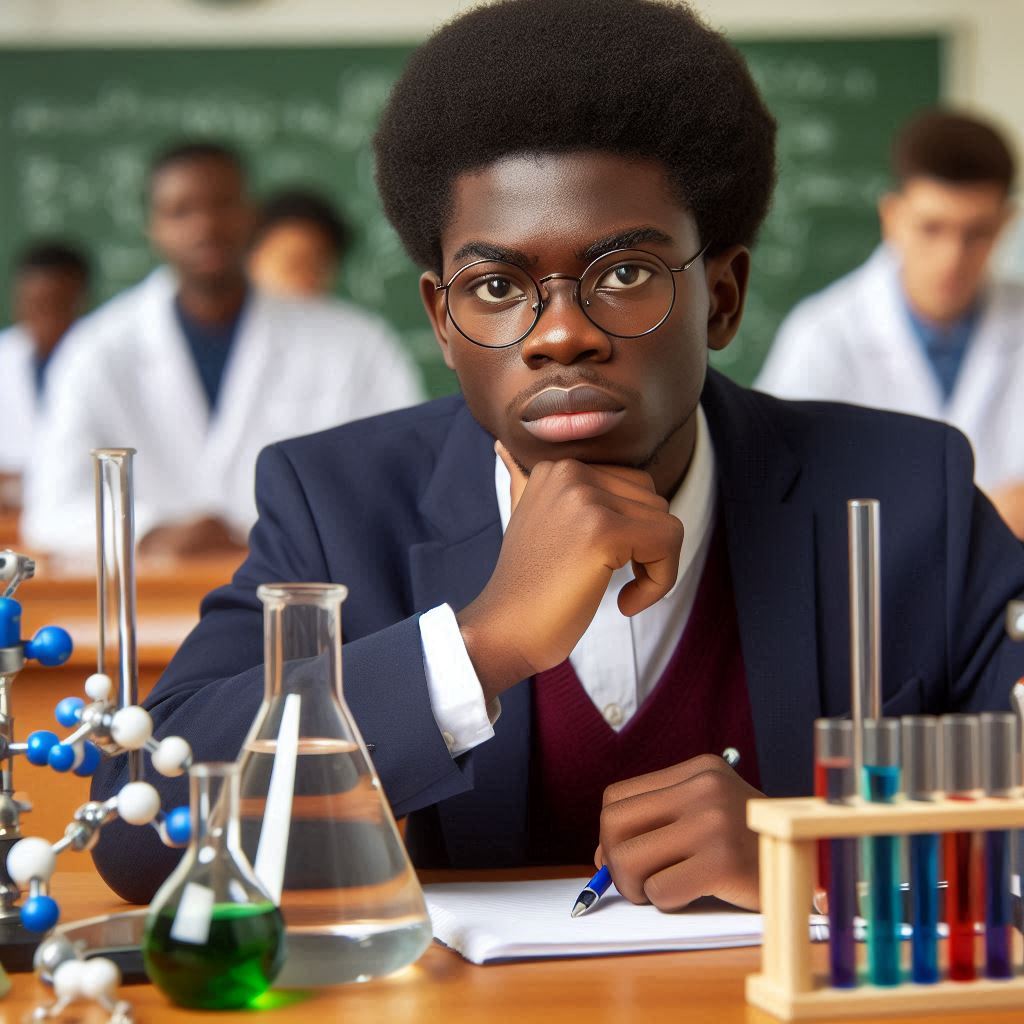Introduction
Practical labs in chemistry education involve hands-on experiments and activities that complement theoretical learning.
They are crucial for enhancing students’ understanding and retention of complex concepts.
Practical labs help students develop essential skills, such as problem-solving, critical thinking, and proper laboratory techniques.
These labs provide real-world applications of theoretical knowledge, making learning more engaging and effective.
Practical labs allow students to directly interact with the materials and processes they learn about in textbooks.
By conducting experiments, students observe chemical reactions, test hypotheses, and analyze results, reinforcing their comprehension of abstract concepts.
These hands-on experiences are essential for solidifying knowledge and building confidence in their scientific abilities.
Currently, practical labs in Nigeria face numerous challenges, including inadequate funding, outdated equipment, and limited access to modern facilities.
Many schools lack the necessary resources to conduct comprehensive experiments, which hinders students’ learning experiences.
Additionally, some institutions struggle with maintaining safety standards, further complicating the effective use of labs.
Challenges Facing Practical Labs in Nigeria
When it comes to practical labs for chemistry education in Nigeria, there are several challenges that need to be addressed to improve the overall quality of education. Some of the key challenges include
Lack of Proper Infrastructure and Equipment
One of the major challenges facing practical labs in Nigeria is the lack of proper infrastructure and equipment.
Many schools and universities do not have access to state-of-the-art facilities and tools needed for effective chemistry education. This lack of resources hinders the ability of students to fully engage in hands-on experiments and learn practical skills.
Inadequate Funding for Maintenance and Supply of Chemicals
Another significant challenge is the inadequate funding for the maintenance and regular supply of chemicals in the labs.
Without proper funding, labs struggle to keep equipment in working order and provide students with necessary chemicals for experiments. This limitation can greatly impact the quality of education and the learning experience for students.
Shortage of Qualified Laboratory Technicians and Mentors
There is also a shortage of qualified and trained laboratory technicians and mentors in Nigeria.
These individuals play a crucial role in guiding students through experiments, ensuring safety protocols are followed, and providing valuable insights and support. The lack of skilled professionals in this field can negatively affect the overall effectiveness of practical labs.
Safety Concerns and Inadequate Safety Measures
Safety concerns are another challenge facing practical labs in Nigeria. Many labs lack proper safety measures and protocols, putting students at risk of accidents or exposure to harmful chemicals.
It is essential to prioritize safety in labs to create a secure learning environment for students and prevent any potential harm.
In review, addressing these challenges is crucial to improving the quality of practical labs for chemistry education in Nigeria.
By investing in infrastructure, funding, training, and safety measures, educational institutions can enhance the overall learning experience and equip students with the practical skills needed for success in the field of chemistry.
Read: Future Prospects of Secretarial Education in Nigeria
Strategies to Improve Practical Labs in Nigeria
Increased Government Funding for Education and Laboratory Infrastructure
Improving practical labs in Nigeria starts with increased government funding. The government must allocate more funds specifically for educational infrastructure.
This includes modernizing and expanding laboratory facilities. By prioritizing education in the national budget, the government can ensure that schools are equipped with the necessary resources.
Adequate funding will provide modern equipment, reliable supplies, and well-maintained lab spaces. This investment will significantly enhance the quality of chemistry education.
Collaboration with International Organizations and Universities
Collaboration with international organizations and universities can further improve practical labs. These partnerships can facilitate equipment donations and training programs.
International institutions often have surplus equipment that can benefit Nigerian schools. They can also offer expertise and training for Nigerian educators and lab technicians.
Such collaborations will not only provide resources but also introduce best practices in lab management and instruction. By leveraging global knowledge and resources, Nigeria can enhance its educational standards.
Training and Continuous Professional Development for Lab Technicians and Mentors
Training and continuous professional development for lab technicians and mentors are crucial. Skilled personnel are essential for the effective operation of practical labs.
Regular training programs can update lab technicians on the latest techniques and safety protocols. Continuous professional development ensures that educators stay current with advancements in chemistry education.
Workshops, seminars, and certification programs can provide ongoing learning opportunities. Investing in human resources will ensure that practical labs operate efficiently and safely.
Implementation of Strict Safety Guidelines and Protocols in the Labs
Implementing strict safety guidelines and protocols is vital for improving practical labs. Safety must be a top priority in any educational setting.
Developing comprehensive safety standards will protect students and staff from accidents and injuries. These guidelines should cover proper handling of chemicals, use of protective gear, and emergency procedures.
Regular safety drills and inspections can reinforce these protocols. Ensuring a safe laboratory environment is essential for fostering a conducive learning atmosphere.
Enhanced Monitoring and Evaluation Systems
Implementing robust monitoring and evaluation systems will further improve practical labs. Regular assessments can identify gaps and areas for improvement.
These evaluations should cover equipment functionality, safety compliance, and overall lab effectiveness. Feedback from students and educators can also provide valuable insights.
Continuous monitoring ensures that laboratories maintain high standards and adapt to changing needs. By addressing issues promptly, schools can ensure that their labs remain effective learning spaces.
Engaging Private Sector and Alumni Support
Engaging private sector and alumni support can provide additional resources for practical labs. Companies in the chemical industry can sponsor lab equipment and supplies.
Alumni can contribute by donating funds or volunteering their expertise. Building strong relationships with these stakeholders can create sustainable support networks.
Their contributions can significantly enhance the quality of practical labs, benefiting current and future students.
Essentially, improving practical labs in Nigeria requires a multifaceted approach. Increased government funding, international collaborations, and continuous training are essential.
Strict safety guidelines and enhanced monitoring systems will ensure effective lab operations. Engaging the private sector and alumni can provide additional support.
By implementing these strategies, Nigeria can significantly improve its chemistry education, preparing students for successful careers in science and technology.
Read: Career Paths for Graduates of Counsellor Education
Successful examples of practical labs in Nigeria
When it comes to practical labs for chemistry education in Nigeria, there are several schools and institutions that stand out for their well-equipped and functional chemistry labs.
These labs not only provide students with the necessary resources to conduct experiments but also offer a conducive environment for learning and discovery.
Schools or institutions with well-equipped and functional chemistry labs
- University of Lagos: The University of Lagos is known for its state-of-the-art chemistry labs that provide students with hands-on experience in various experiments and research projects.
- Obafemi Awolowo University: OAU boasts well-equipped labs that have been instrumental in producing groundbreaking research in the field of chemistry.
- Federal University of Technology, Minna: FUT Minna’s chemistry labs are well-stocked with modern equipment, allowing students to explore the practical aspects of the subject.
Interviewing students and teachers to share their experiences and benefits of practical labs
We spoke to students and teachers from various institutions to gather their insights on the benefits of practical labs in chemistry education. Here are some of the highlights from our interviews
- Students emphasized that practical labs helped them understand theoretical concepts better and enhanced their problem-solving skills.
- Teachers noted that practical labs provided a platform for students to apply classroom knowledge in real-world scenarios, thus deepening their understanding of chemistry.
- Both students and teachers agreed that practical labs fostered curiosity and a passion for experimentation, leading to a more engaging learning experience.
Projects or research done in these labs that have made an impact in the field of chemistry
Several projects and research initiatives conducted in these well-equipped labs have made significant contributions to the field of chemistry. Here are a few noteworthy examples:
- Development of new catalysts for green chemistry applications, resulting in more sustainable and environmentally friendly chemical processes.
- Investigation of novel materials with potential applications in drug delivery, energy storage, and other critical areas of chemistry research.
- Collaboration with industry partners to develop innovative solutions to pressing challenges, showcasing the practical relevance of chemistry education in Nigeria.
Therefore, practical labs play a crucial role in shaping the next generation of chemists in Nigeria.
By providing students with hands-on experience, fostering a spirit of inquiry, and enabling groundbreaking research, these labs are instrumental in advancing the field of chemistry and preparing students for successful careers in the industry.
Read: Role of Secretarial Staff in Nigerian Organizations

The role of technology in enhancing practical labs
Technology plays a crucial role in enhancing practical labs for chemistry education in Nigeria. By leveraging digital tools, educators can provide students with a more interactive and engaging learning experience.
Introduction of Virtual Labs and Simulation Software
One way technology enhances practical labs is through the introduction of virtual labs and simulation software.
These tools allow students to conduct experiments in a virtual environment, providing a safe and cost-effective way to explore complex chemical reactions.
Utilization of Online Resources and Videos
Online resources and videos can be utilized for pre-lab preparation and post-lab analysis.
Students can access instructional videos and study materials online to better understand the concepts before entering the lab and review the experiment afterward for deeper learning.
Incorporation of Digital Tools for Data Collection
Digital tools enable efficient data collection and analysis in the labs. With the use of sensors and data logging devices, students can collect real-time data during experiments, analyze the results, and draw conclusions based on evidence.
Benefits of Technology in Practical Labs
- Enhances students’ understanding of complex chemical concepts.
- Promotes active learning and engagement in the lab.
- Allows for remote and distance learning opportunities.
- Encourages collaborative learning and teamwork.
- Provides instant feedback and assessment for student performance.
Generally, technology is a valuable asset in modernizing practical labs for chemistry education in Nigeria.
By embracing digital tools and resources, educators can create a dynamic and interactive learning environment that fosters student success and achievement in the field of chemistry.
Read: Future Prospects of Secretarial Education in Nigeria
Recommendations for policymakers and stakeholders
Advocating for Increased Investment in Practical Labs and STEM Education
Policymakers and stakeholders must prioritize investment in practical labs and STEM education.
Practical labs are vital for comprehensive chemistry education, providing hands-on experience that reinforces theoretical knowledge.
Increased funding for modern laboratory equipment and facilities can significantly enhance the quality of education.
Investing in STEM education will prepare students for future careers in science and technology, crucial for Nigeria’s development.
To achieve this, the government should allocate more resources to educational budgets, ensuring that schools and universities have the necessary infrastructure for effective teaching and learning.
Encouraging Partnerships with Industry and Research Institutions for Collaboration and Support
Partnerships between educational institutions, industry, and research organizations are essential for the growth of practical labs.
These collaborations can provide access to cutting-edge technology, expertise, and financial support.
Industry partners can offer internships, training programs, and real-world problem-solving experiences, enriching students’ education.
Research institutions can collaborate on projects, providing students with exposure to advanced scientific research and methodologies.
Policymakers should create incentives for such partnerships, fostering a collaborative ecosystem that benefits both education and industry.
Encouraging private sector investment in educational initiatives can also bridge the gap between academia and the workforce.
Implementing Long-Term Strategies for Sustainability and Growth of Practical Labs in Nigeria
Sustainable development of practical labs requires long-term strategies and planning. Policymakers must focus on creating frameworks that ensure continuous improvement and maintenance of laboratory facilities.
This includes regular updates to equipment, ongoing training for educators, and implementing best practices in lab management.
Establishing a national body to oversee the development and maintenance of practical labs can ensure consistency and quality across educational institutions.
Additionally, integrating environmental sustainability practices in labs, such as waste management and energy efficiency, will align with global standards and promote responsible scientific practices.
One key strategy is to embed practical lab requirements in the national curriculum, making them an integral part of the education system.
This ensures that every student has access to hands-on learning experiences. Additionally, leveraging technology, such as virtual labs and online simulations, can complement physical labs and provide flexible learning opportunities.
Stakeholders should also focus on community engagement and awareness programs to highlight the importance of practical labs in education.
By showcasing successful case studies and outcomes, they can garner public support and encourage more significant investments in STEM education.
Delve into the Subject: Agricultural Science Clubs and Societies in Nigeria
Conclusion
Recap of the importance of practical labs in chemistry education: Practical labs play an indispensable role in chemistry education.
They provide students with hands-on experience that bridges the gap between theoretical knowledge and real-world applications.
Through laboratory experiments, students can observe chemical reactions, test hypotheses, and understand the properties and behaviors of different substances.
This hands-on approach fosters critical thinking, enhances problem-solving skills, and deepens their understanding of complex chemical concepts.
Without practical labs, students would miss the opportunity to engage directly with the subject matter, hindering their overall learning experience and limiting their ability to grasp essential scientific principles.
Call to action for stakeholders to prioritize and support the improvement of practical labs in Nigeria: It is imperative for stakeholders, including government agencies, educational institutions, and private sector partners, to prioritize and support the improvement of practical labs in Nigeria.
Investments in modern equipment, updated facilities, and continuous teacher training are essential to creating a conducive learning environment for students.




